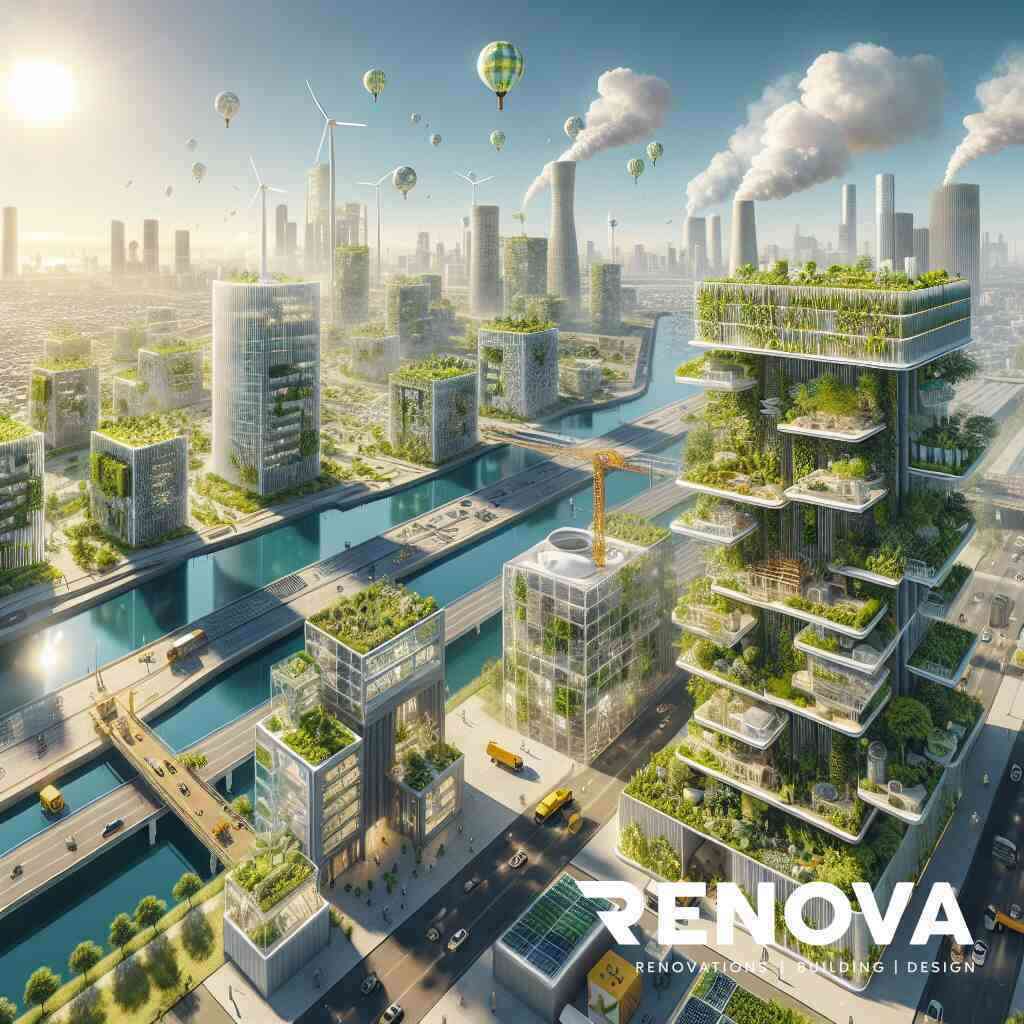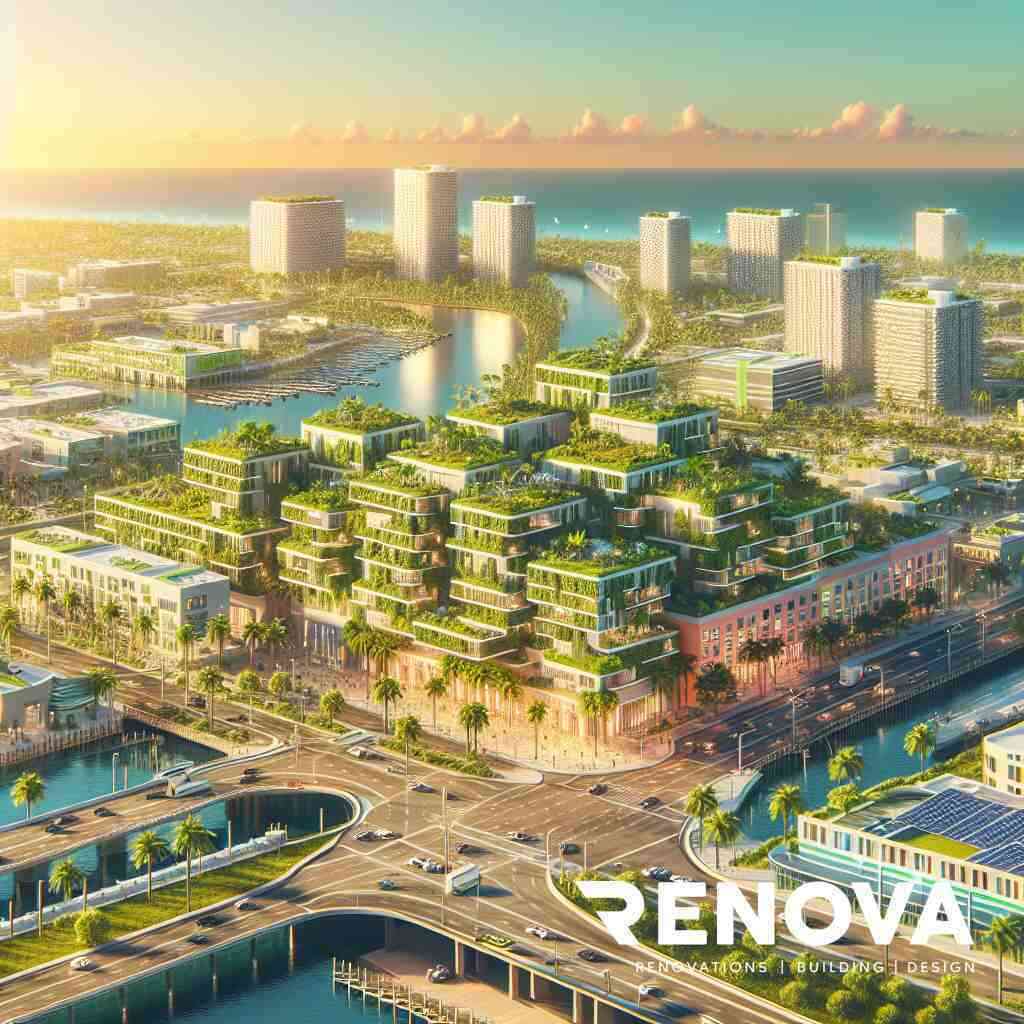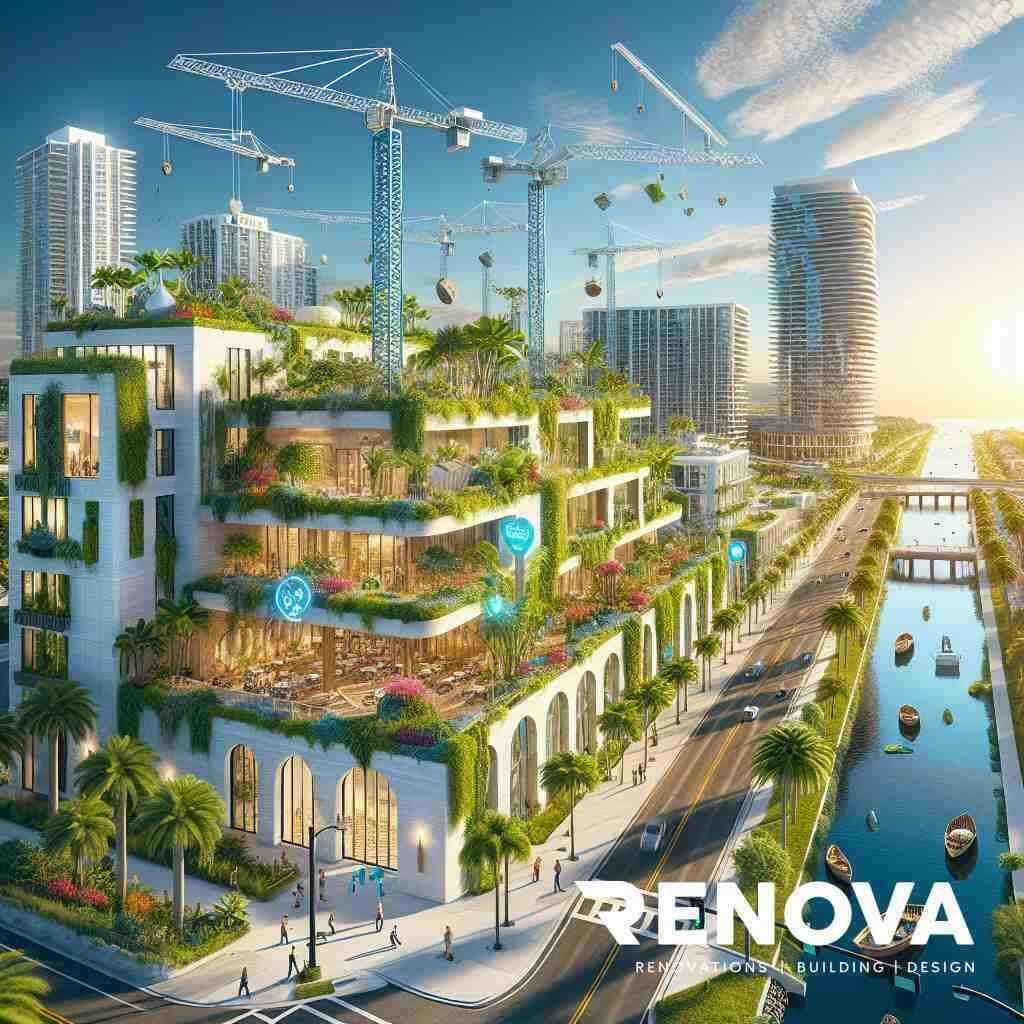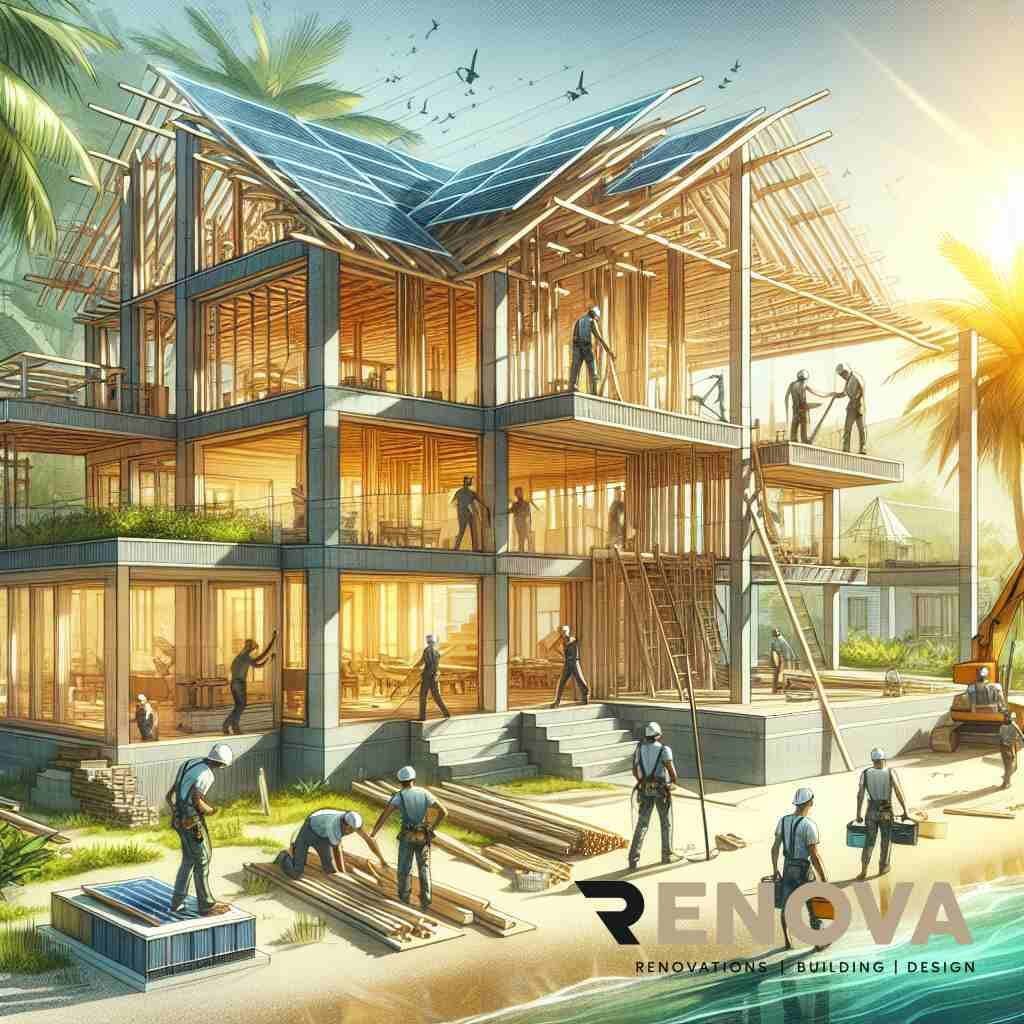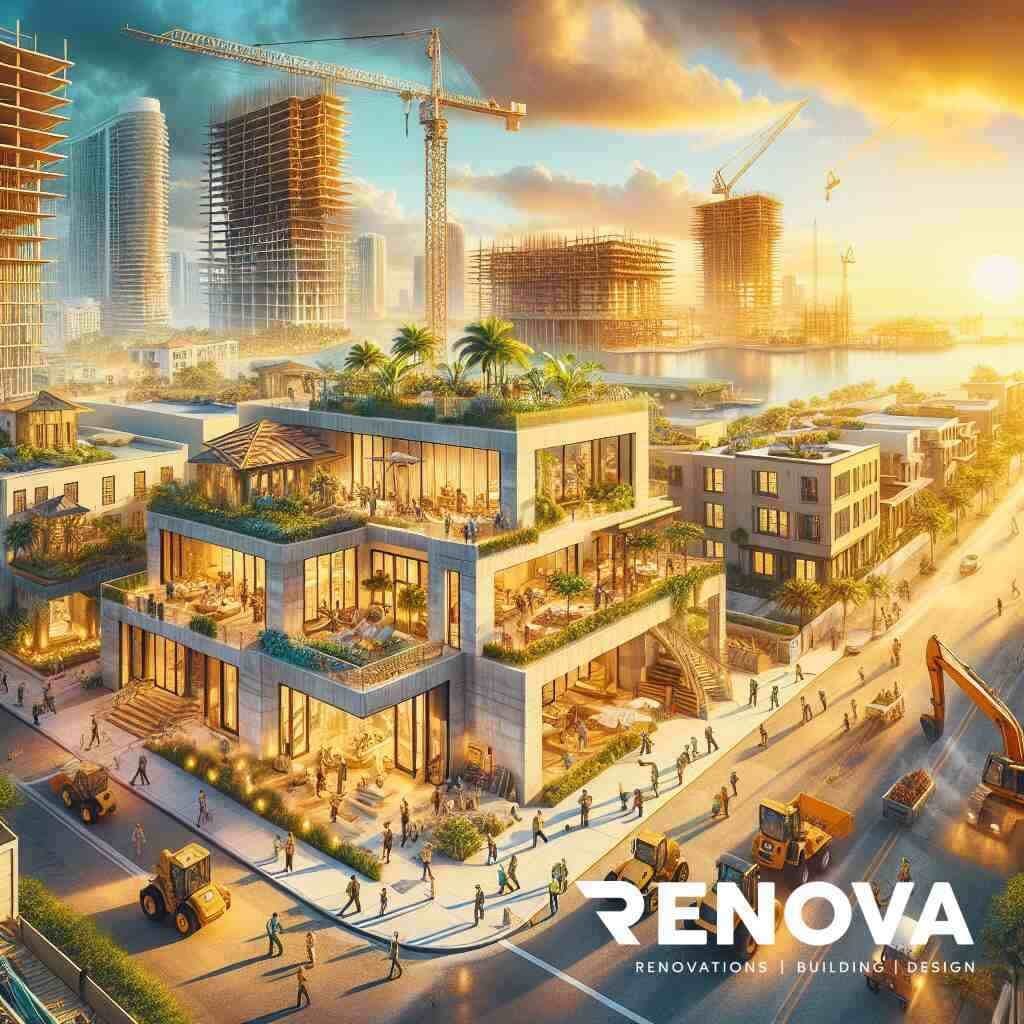Introduction to Innovative Construction Materials in 2024
The evolution of construction materials
The journey of construction materials has been transformative, tracing back from the utilization of natural resources like wood and stone to today’s era of engineered materials and composites. This evolutionary path reflects humanity’s unending quest for durability, efficiency, and sustainability. As we sail into 2024, the construction industry stands on the cusp of a new material revolution characterized by innovative solutions such as self-healing concrete, 3D-printed components, and materials designed with sustainability at their core. The embracement of these materials is not just a testament to technological advancements but also mirrors a deeper understanding of our interaction with the environment and the need for materials that can reduce carbon footprints, enhance energy efficiency, and minimize waste.
Why innovation matters in construction
Innovation in the construction sector is pivotal for multiple reasons. Firstly, it addresses the growing concerns related to environmental sustainability and the urgent need to mitigate the adverse effects of construction activities on our planet. Innovative materials offer pathways to significantly lower greenhouse gas emissions and reduce resource depletion. Secondly, they cater to the increasing global demand for buildings that are not only cost-effective but also resilient to changing climates and natural disasters. Furthermore, innovation fuels economic advancement by generating new markets and employment opportunities in the green building sector. For companies like RENOVA, positioning at the forefront of using innovative materials means staying competitive in a rapidly evolving industry and meeting the expanding desires of eco-conscious consumers.
The impact of sustainability on construction practices
Sustainability in construction goes beyond mere environmental conservation; it encompasses economic and social dimensions, aiming to fulfill present needs without jeopardizing future generations. The integration of sustainable, innovative construction materials plays a critical role in this regard. By optimizing energy performance, enhancing durability, and using resources more efficiently, these materials offer a blueprint for buildings that significantly lessen environmental impacts throughout their lifecycle. Moreover, sustainable construction supports public health and productivity through improved air quality and natural lighting while simultaneously promoting the usage of local and renewable resources. It’s this holistic approach to building that embodies the true essence of sustainability, paving the way for a sustainable urban development model that RENOVA and similar forward-thinking entities are eager to advocate for and adopt in projects across Delray Beach and beyond.
Incorporating sustainable building materials, RENOVA champions eco-friendly construction practices that align with the ethos of responsible stewardship of the environment while addressing the pressing demands of modern construction.
Sustainable and Eco-friendly Construction Materials
As RENOVA continues to lead in innovative and sustainable construction in South Florida, a closer look at the materials that are shaping the future is essential. In 2024, construction materials are not just about building solid structures; they’re about creating a sustainable future. Here, we explore some of the most promising eco-friendly materials and technologies that are transforming the industry.
Green building materials for the future
The movement towards green building materials is gaining unprecedented momentum, driven by an awareness of the environmental impact of traditional construction practices. These sustainable building materials, ranging from recycled plastics to bamboo, offer reduced energy consumption, lower emissions, and a significantly smaller carbon footprint. RENOVA integrates these materials into projects across Delray Beach and Palm Beach County, emphasizing their durability, cost-effectiveness, and minimal environmental impact. As a licensed general contractor, RENOVA understands the importance of leveraging these materials not only to meet regulatory standards but also to accommodate the growing demand for eco-conscious living spaces.
Recycled construction materials and their benefits
Recycled construction materials are at the forefront of sustainable building practices. By reusing materials such as steel, glass, and plastic, the construction industry can substantially decrease the demand for natural resources, reduce landfill waste, and lower energy consumption associated with producing new materials. The benefits of recycled building materials are manifold, offering a pathway to not only more sustainable construction practices but also innovative architectural designs. RENOVA proudly incorporates these materials into its projects, demonstrating a commitment to environmental stewardship and innovation.
Bio-based insulation options for enhanced sustainability
Insulation plays a crucial role in energy efficiency and sustainability in buildings. Bio-based insulation materials, derived from natural fibers such as wood pulp, hemp, and sheep’s wool, offer superior sustainability credentials. These materials are not only renewable but also provide excellent thermal and acoustic insulation properties. Their use in construction supports RENOVA’s commitment to enhancing energy efficiency and sustainability in homes and commercial buildings throughout Delray Beach and beyond. By integrating bio-based insulation into new construction and renovation projects, RENOVA is setting a benchmark for eco-friendly building practices in South Florida.
Solar reflective materials and their impact on energy efficiency
Solar reflective materials, designed to reflect more sunlight and absorb less heat than standard building materials, have a significant impact on a building’s energy efficiency. Incorporating these materials into roofing and exterior surfaces can reduce the need for air conditioning, lower energy bills, and contribute to urban heat island mitigation. RENOVA’s implementation of solar reflective materials in its construction projects is an embodiment of its forward-thinking approach to energy-efficient home remodels and new constructions, aligning with the broader goals of sustainable urban development in Delray Beach and the surrounding areas.
Through these innovative materials and practices, RENOVA is not just constructing buildings; it’s building a sustainable future for South Florida. This commitment to sustainability, combined with a dedication to quality and client satisfaction, positions RENOVA as a leader in the construction industry, ready to meet the challenges and opportunities of 2024 and beyond.
Technological Advancements in Construction Materials
Self-healing concrete and its potential to revolutionize construction
Self-healing concrete represents a breakthrough in modern construction materials, embodying innovative engineering at its finest. This material, endowed with the capacity to repair its cracks autonomously, ushers in a new era of durability and sustainability in construction. By embedding healing agents directly into the concrete mix, these innovative agents are activated upon cracking, thereby initiating the healing process. This technology not only extends the structure’s lifespan but also significantly reduces maintenance costs and environmental impact associated with repairs. RENOVA, as a renovation near me in Delray Beach, sees self-healing concrete as not just a material but a pivotal advancement that promises to underpin future construction projects, enhancing structural integrity and resilience.
Nanotechnology in construction for improved material properties
Nanotechnology is making waves in the construction industry by transforming ordinary materials into extraordinary solutions with enhanced performance characteristics. By manipulating materials at the molecular or atomic level, nanotechnology allows for the development of construction materials that possess remarkable strength, durability, and thermal efficiency. For instance, nanoscale additives can make concrete more resistant to water and cracks, while nano-coatings can improve surface durability and self-cleaning properties. RENOVA recognizes the transformative potential of nanotechnology in constructing buildings that are not only more resilient and energy-efficient but also environmentally friendly, setting a new standard for building innovation in Palm Beach.
The role of 3D printed construction in modern building practices
3D printing technology in construction opens up a world of possibilities for creating complex, customized building components with precision and efficiency. This technology, characterized by its layer-by-layer fabrication process, allows for the rapid construction of structures with reduced material waste and labor costs. From creating bespoke architectural features to entire homes, 3D printing promotes design freedom, sustainability, and innovation. RENOVA is keen on exploring 3D-printed building practices to pioneer novel architectural designs and sustainable construction solutions. Embracing 3D printing signifies a step towards future-ready construction techniques that promise speed, customization, and environmental stewardship.
Innovative uses of smart construction technology
Innovative construction technology is revolutionizing the way buildings are designed, constructed, and operated. With the integration of IoT (Internet of Things) devices, AI (Artificial Intelligence), and other digital tools, construction projects can achieve higher levels of efficiency, safety, and quality control. These technologies enable real-time monitoring of construction sites, predictive maintenance, and even energy management in completed buildings. By adopting innovative construction technology, RENOVA is not just constructing buildings; it is crafting intelligent environments that adapt to the needs of their occupants. Whether through improved project management, enhanced worker safety, or optimized building performance, RENOVA leverages innovative construction technology applications to deliver cutting-edge projects that epitomize the future of the construction industry.
Specialized High-Performance Materials

Geopolymer Concrete as a Sustainable Alternative
The construction industry is continuously seeking materials that offer both high performance and environmental sustainability. Geopolymer concrete emerges as a pivotal solution in this quest. Unlike traditional Portland cement, which is associated with significant CO2 emissions during production, geopolymer concrete is manufactured using industrial by-products like fly ash or slag, thereby substantially reducing its carbon footprint. This innovative material is not only geopolymer concrete as a sustainable alternative that offers enhanced durability and resistance to chemicals but also contributes to the reduction of greenhouse gas emissions in the construction sector. RENOVA, aware of its potential, actively integrates geopolymer concrete in projects, exemplifying its commitment to eco-friendly building practices.
Aerogel Insulation for Superior Thermal Performance
Aerogel, often termed ‘frozen smoke’ due to its translucent appearance, stands at the forefront of insulation technology. It’s remarkable properties-lightweight, robust thermal resistance, and minimal thermal conductivity make it an ideal material for high-performance insulation solutions. Buildings utilizing aerogel insulation benefit from enhanced energy efficiency, significantly reducing the need for heating and cooling. This reduction leads to lowered energy costs and a subsequent decrease in the building’s carbon footprint. Integrating such materials is part of RENOVA’s dedication to energy-efficient home remodeling, aiming to redefine the standards of sustainable living environments in South Florida and beyond.
The Benefits of High-Performance Glazing in Energy Conservation
High-performance glazing systems are revolutionizing the way buildings manage light and heat. By incorporating multiple layers of glass combined with low-emissivity coatings and inert gas fills, these systems drastically reduce unwanted heat transfer. The result is a significant enhancement in a building’s energy efficiency, with substantial reductions in heating and cooling demands. RENOVA values the integration of high-performance glazing into their projects not only for its energy conservation benefits but also for the improved comfort it offers occupants. Through such advancements, the company continually addresses both the aesthetic and functional aspects of modern construction, ensuring buildings are not just structures but optimized living environments.
Phase Change Materials for Smart Thermal Regulation
Phase change materials (PCMs) offer a cutting-edge approach to temperature regulation within buildings. By absorbing or releasing heat in response to temperature changes, PCMs help maintain a consistent indoor environment. This intelligent thermal regulation translates to reduced reliance on traditional heating and cooling systems, leading to energy savings and enhanced occupant comfort. RENOVA, always at the forefront of innovative construction solutions, sees the value in incorporating PCMs into their building designs. Such materials not only bolster the performance and efficiency of their projects but also align with the broader goal of sustainable and resilient construction practices in the face of changing climates. This approach underlines RENOVA’s vision for future-ready buildings that are both comfortable and environmentally responsible.
Future-Forward Construction Techniques
Modular construction materials and their advantages
Modular construction materials represent a significant shift toward more efficient, eco-friendly, and cost-effective building practices. This approach, leveraging pre-manufactured modules or sections, allows for the rapid assembly of structures on-site, significantly reducing construction time and labor costs. The controlled factory setting ensures high-quality materials and artistry, minimizing waste and the environmental impact often associated with traditional construction methods. Moreover, modular construction offers unparalleled flexibility, allowing for customizable designs that can quickly adapt to future needs. By incorporating modular construction materials, RENOVA takes advantage of these benefits, delivering projects that are not only aesthetically pleasing but also sustainable and efficient.
Prefabricated construction as a time and cost-saving solution
Prefabricated construction continues to transform the building landscape by offering solutions that are both time-efficient and cost-effective. This innovative method involves constructing parts of a building off-site in a factory-like environment, followed by transporting and assembling them on the construction site. The advantages of prefabricated construction include reduced material waste, enhanced quality control, and shorter construction timelines. Such an approach aligns with RENOVA’s commitment to innovative construction materials, as it not only streamlines the construction process but also substantially lowers the overall project cost. Implementing prefabricated elements in construction projects exemplifies RENOVA’s forward-thinking strategy to meet the evolving needs of the construction industry efficiently.
Adaptive reuse materials for sustainable urban development
Adaptive reuse is an innovative strategy that breathes new life into old buildings, turning them into functional spaces that meet today’s needs without the need for new construction. This method emphasizes the strategic selection of materials that can be repurposed, recycled, or used in novel ways to revitalize existing structures. The practice encourages sustainability by reducing demolition waste and preserving historical and cultural landmarks within urban environments. RENOVA champions this approach in Delray Beach’s sustainable urban development, utilizing adaptive reuse materials to transform outdated buildings into vibrant, functional spaces, underscoring the importance of sustainability and efficiency in modern urban landscape transformation.
The benefits of insulating concrete forms in residential and commercial projects
Insulating Concrete Forms (ICFs) are revolutionizing the way buildings are constructed, offering superior energy efficiency, strength, and noise reduction over traditional building methods. Made from interlocking molded foam blocks filled with concrete, ICFs create a sturdy and well-insulated wall system that significantly reduces heating and cooling costs, offering an eco-friendly solution to energy consumption. Their resilience also makes them an ideal choice for areas prone to severe weather, providing enhanced protection against storms and temperature extremes. By incorporating ICFs into both residential and commercial projects, RENOVA demonstrates a commitment to delivering not only energy-efficient but also safe and durable structures. The use of ICFs exemplifies RENOVA’s dedication to sustainable construction techniques that pave the way for a greener, more resilient future in construction.
Conclusion: Embracing the Future of Construction Materials
The Role of Innovative Materials in Shaping the Future of Construction
The construction sector stands at a pivotal juncture where the embrace of innovative materials is essential not only for sustainability but also for the progress of the industry. The journey to 2024 and beyond sees building materials evolving from traditional commodities to intelligent, sustainable innovations capable of reducing environmental impact, enhancing structural integrity, and revolutionizing the aesthetics of construction. Materials like self-healing concrete in modern construction and geopolymer concrete redefine longevity and durability, while advanced insulations and glazing solutions promise to improve energy efficiency dramatically.
The initiative to integrate these materials reflects a broader understanding of the construction industry’s role in addressing global environmental and societal challenges. By adopting these cutting-edge solutions, we can witness a significant shift in how buildings are conceived, designed, and inhabited, emphasizing the harmonious balance between human needs and environmental stewardship.
How RENOVA is Integrating These Materials into New Construction and Home Renovations
RENOVA, a beacon of innovation in South Florida’s bustling construction landscape, is actively incorporating these futuristic materials into its projects, from residential to commercial ventures. Through a meticulous selection process, RENOVA identifies materials that not only promise superior performance and durability but also align with the firm’s core values of sustainability and elegance.
In its residential projects, RENOVA has leveraged bio-based insulation for better energy conservation and aerogel insulation for unmatched thermal performance. For commercial constructions, intelligent technologies like phase change materials and high-performance glazing are deployed to optimize environmental controls and enhance occupant comfort. RENOVA’s journey into the future of construction is showcased across its various platforms, with the RENOVA Pinterest for green building inspiration serving as a testament to its commitment to eco-conscious and innovative building practices.
The Importance of Continued Innovation and Sustainability in the Construction Industry
The construction industry’s path toward innovation and sustainability is not just a trend but a necessity in the face of rapidly changing global conditions. This direction is driven by an urgent need to minimize environmental footprints, enhance building functionalities, and cater to the evolving demands of society. As RENOVA and similar forward-thinking entities lead by example, they set new benchmarks for the industry at large.
Continued innovation in materials and building practices is crucial for addressing issues like climate change, resource scarcity, and urbanization challenges. Sustainability, in this context, transcends environmental considerations to include economic and social dimensions, ensuring that the built environment contributes positively to our quality of life and the health of our planet.
As we look towards the future, it is clear that the integration of innovative materials and sustainable practices will fundamentally reshape the construction landscape. Companies like RENOVA are at the forefront of this transformation, showing that through ingenuity and commitment, the industry can indeed build a better, more sustainable world for generations to come.
Frequently Asked Questions
Question: What are some of the significant benefits of using sustainable construction materials in projects today?
Answer: The use of sustainable construction materials comes with a plethora of benefits, highlighting environmental sustainability, energy efficiency, and enhanced building performance. Materials like geopolymer concrete and bio-based insulation contribute significantly to reducing the carbon footprint by utilizing low-carbon solutions and recycled content. Furthermore, sustainable materials often result in better energy efficiency for buildings, leading to decreased operational costs over time. By integrating intelligent construction technology and innovative building materials such as self-healing concrete and aerogel insulation, RENOVA helps create structures that are not only eco-friendly but also durable, resilient, and cost-effective in the long run, ensuring our clients invest in a sustainable future without compromising on quality.
Question: In “Exploring Innovative Construction Materials in 2024,” how is RENOVA integrating these new materials into their construction projects?
Answer: In our journey through “Exploring Innovative Construction Materials in 2024,” RENOVA is actively incorporating cutting-edge materials into both new construction and home renovations to meet the growing demand for sustainability and innovation. Our focus is on materials that promise environmental stewardship, durability, and architectural freedom. For instance, we’re utilizing solar reflective materials to enhance energy efficiency and self-healing concrete for increased structural longevity. Furthermore, our commitment to sustainable construction practices is evident in our preference for recycled construction materials, modular construction techniques, and intelligent construction technology, ensuring every project we undertake is a step toward a greener future. Through meticulous selection and expert integration, RENOVA is setting new standards for sustainable living environments in South Florida.
Question: Can RENOVA custom tailor construction projects to incorporate specific innovative materials or green building practices requested by the client?
Answer: Absolutely, RENOVA prides itself on its client-centric approach to construction projects, from custom homes to comprehensive renovations. Our team of seasoned professionals, including licensed general contractors and interior designers, works closely with clients to understand their specific needs and aspirations for sustainable and innovative building solutions. Whether it’s integrating bio-based insulation for enhanced energy conservation, applying nanotechnology in construction for improved material properties, or employing modular construction materials for efficiency, we customize our construction strategy to align with our client’s preferences and sustainability goals. This tailored approach ensures that each RENOVA project not only meets our high standards but also reflects our clients’ visions for their future-proofed, eco-conscious living spaces.
Question: How does RENOVA ensure the quality and performance of innovative construction materials used in their projects?
Answer: At RENOVA, ensuring the quality and performance of innovative construction materials is fundamental to our construction management process. We start by rigorously vetting all materials for sustainability credentials, durability, and practicality. Our team stays abreast of the latest developments in green building materials and technological advancements through continuous research and collaboration with industry-leading suppliers. By leveraging our extensive experience in new construction and home renovations across South Florida, we perform thorough testing and evaluation to guarantee that all materials, from high-performance glazing to insulating concrete forms, meet our exacting standards for energy efficiency, structural integrity, and environmental impact before they’re integrated into our projects. This comprehensive approach allows us to confidently provide our clients with homes and commercial spaces that are not just beautifully designed but are also built to stand the test of time and nature.
Question: With the evolution of construction materials in 2024, how does RENOVA stay ahead in implementing these innovations effectively?
Answer: Staying ahead of the curve in the rapidly evolving landscape of construction materials and practices is paramount to RENOVA. Our strategy revolves around continuous learning, industry engagement, and leveraging our network of innovative suppliers and technology partners. We invest in ongoing training for our team to ensure they’re skilled in the latest construction techniques and sustainable practices. Our participation in industry conferences, workshops, and green building forums keeps us connected to pioneering advancements and emerging trends in eco-friendly construction, such as renewable energy integration and biomimicry in construction. By proactively adopting and adapting these innovative solutions, RENOVA not only meets but anticipates the needs of the market, ensuring our projects are at the forefront of design, functionality, and sustainability. Our dedication to innovation enables us to deliver exceptional value to our clients and contribute positively to the community and the environment.
